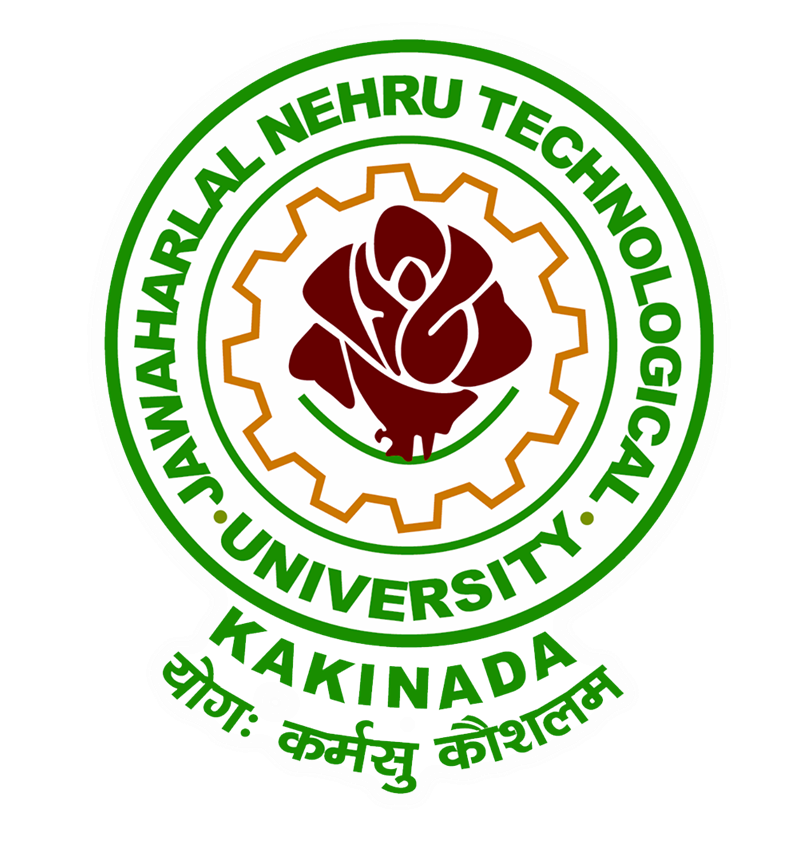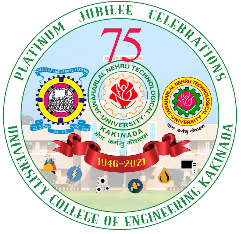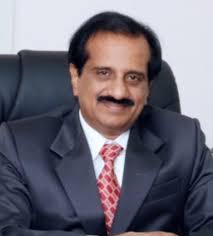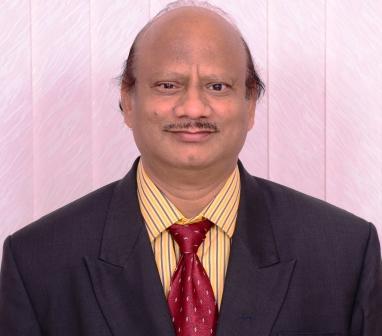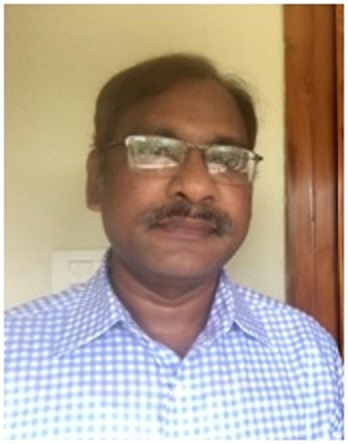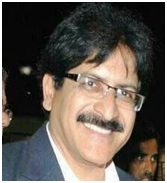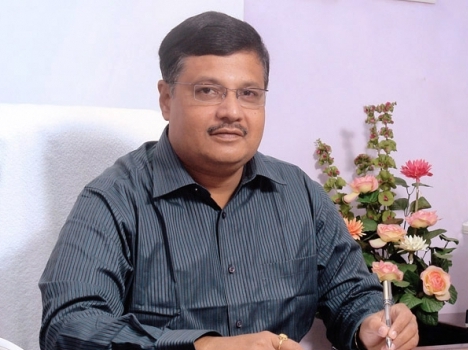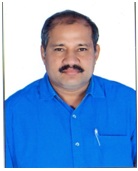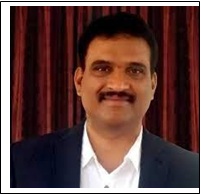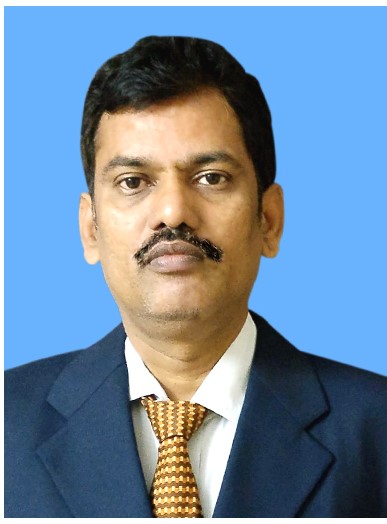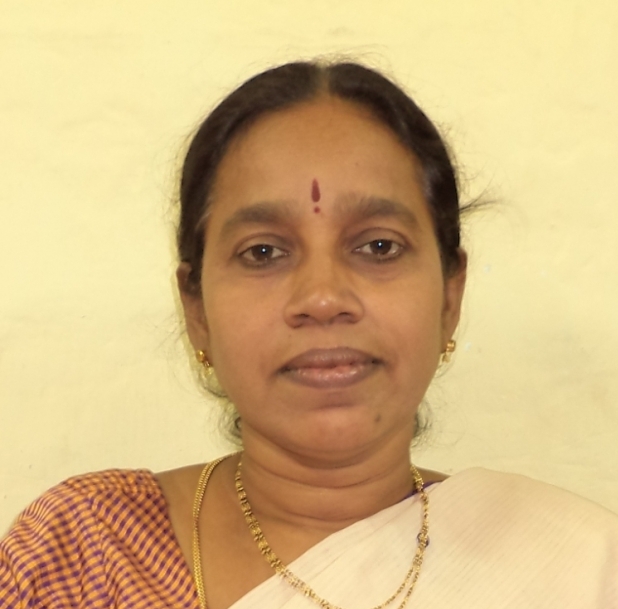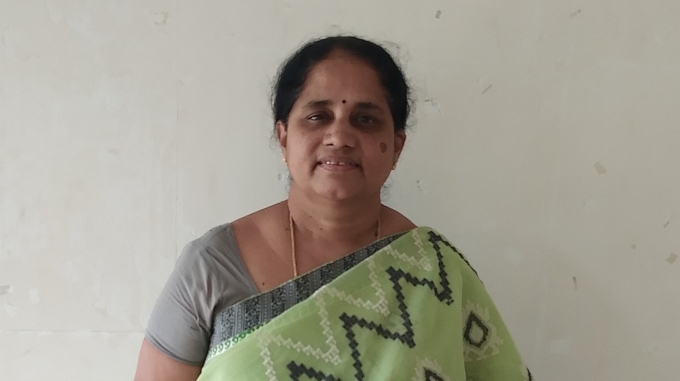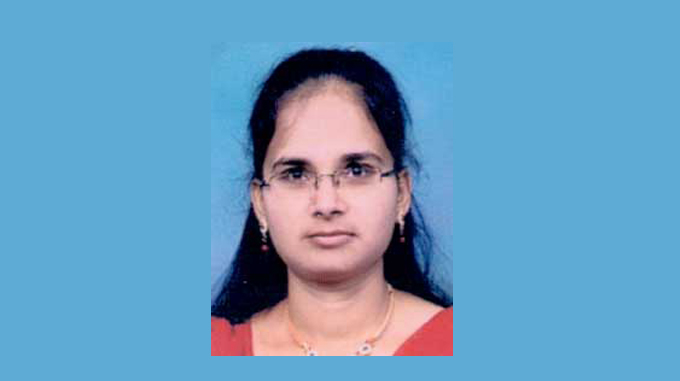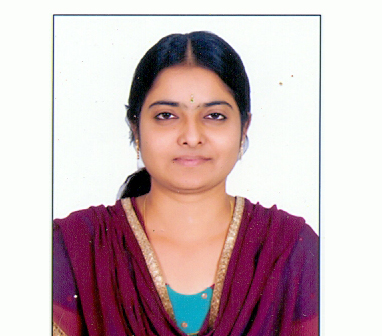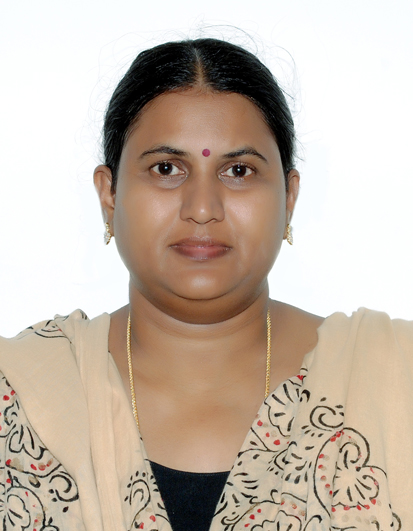HOD’s Desk
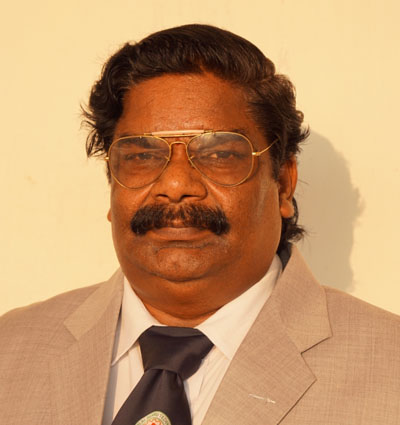
Dr. D Koteswara Rao
Head of the Department
Department of Civil Engineering, JNTUK
B.Tech, M.Tech (G.T.E), C.C.A & D.T.W, Ph.D
Email: dr.dkrjntuk@gmail.com
Office Phone: 8842351664
Department Overview
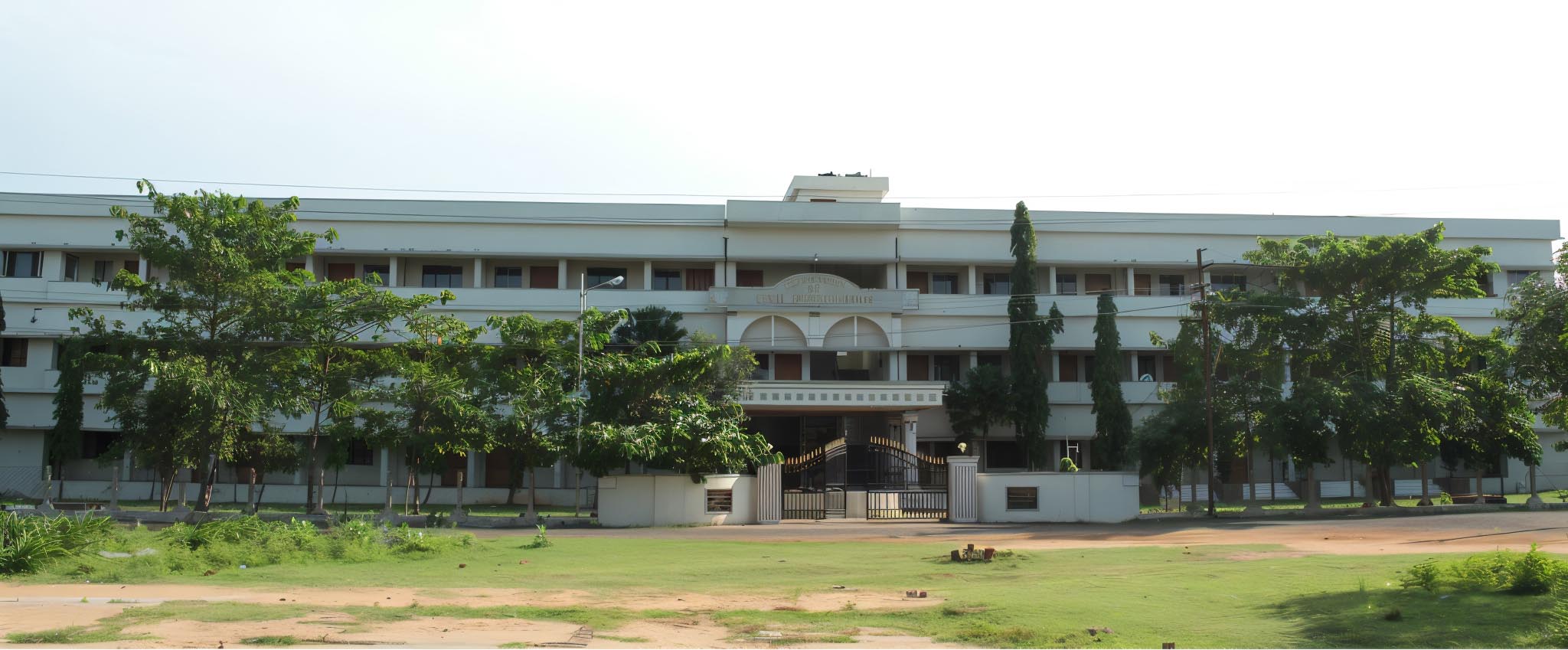
Department of Civil Engineering
The Department of Civil Engineering was established in the year 1946, making it one of the oldest and most prestigious departments of the institution. Over the decades, it has built a strong legacy in academics, research, and consultancy services, contributing significantly to the field of civil engineering both nationally and internationally.
The department offers a Bachelor of Technology (B.Tech) program in Civil Engineering and several Postgraduate (M.Tech) programs, including:
-
Structural Engineering
-
Soil Mechanics and Foundation Engineering
-
Environmental Engineering (if applicable to your curriculum)
To support its academic and research activities, the department hosts a wide range of state-of-the-art laboratories, including:
-
Strength of Materials and Concrete Technology Lab
-
Fluid Mechanics and Hydraulic Machinery Lab
-
Geotechnical Engineering Lab
-
Environmental Engineering Lab
-
Surveying and Transportation Engineering Labs
-
Engineering Geology Lab
-
Computer-Aided Design (CAD) & Geographic Information Systems (GIS) Lab
Postgraduate and research scholars have access to advanced facilities such as:
-
Compression Testing Machines (up to 300T)
-
Tensile Testing and Beam Bending Equipment
-
Cyclic Triaxial Testing Machines
-
Large Box Shear Apparatus
-
CBR and Permeability Apparatus
The Computational Laboratory is well-equipped with industry-standard software tools like:
-
STAAD Pro, STRUDS
-
MATLAB
-
PLAXIS (2D/3D)
-
AutoCAD Civil 3D and GIS platforms
Faculty members are actively engaged in sponsored research, consultancy, and publication in high-impact journals. The department has a vibrant academic culture with guest lectures, workshops, seminars, and industry-institute collaborations to keep students aligned with current trends and technologies.
With a rich history and a future-focused vision, the Department of Civil Engineering continues to uphold academic excellence while contributing to the infrastructural and environmental development of the nation.
Vision & Mission
Vision
To produce competent civil engineers with the capacity to handle challenges in the field of civil engineering and also to perform innovative research for societal needs with professional ethics.
Mission
M1: To produce high-quality learners who are globally competent and professionally skillful in the field of civil.
M2: To offer educational programs that impart inventive knowledge with high levels of ethics and human.
M3:Provide a platform to acquire and implement innovative ideas in research and development.
M4: To build up state-of-the-art laboratories and centers of excellence in different areas of civil engineering.
M5: To train the students and faculty to update their knowledge in emerging technologies to meet industrial requirements.
PEOs, POs & PSOs
B.Tech
PEO-1: Basic Technical Knowledge and Skills for Specialized Careers
This objective ensures that students acquire a strong foundation in core Civil Engineering principles, preparing them for specialized careers in areas like structural, geotechnical, environmental, and transportation engineering, meeting global engineering needs.
PEO-2: Expertise in Project Work, Computing, and Experimental Techniques
This objective focuses on equipping students with practical skills through computing tools (like AutoCAD, MATLAB, STAAD Pro) and experimental techniques (such as concrete testing and soil analysis), preparing them for both Masters programs and professional careers.
PEO-3: Communication, Presentation, and Teamwork Skills
This objective emphasizes the development of strong communication and presentation skills, along with the ability to work effectively in teams, ensuring students are capable of becoming responsible engineers contributing to technological advancement.
M.Tech
Structural Engineering PEOs:
-
PEO 1: Develops the ability to solve mathematical and numerical problems related to structural engineering.
-
PEO 2: Equips students to analyze trusses, beams, and frames, which are fundamental structural elements.
-
PEO 3: Trains students to estimate forces and analyze multi-degree of freedom systems using static, quasi-static, and dynamic methods.
-
PEO 4: Prepares students to design structures that contribute to societal development through safe and innovative solutions.
-
PEO 5: Emphasizes the application of experimental techniques for structural evaluation to assess and improve design.
-
PEO 6: Develops skills to analyze and design structures under various load conditions, ensuring safety and stability.
-
PEO 7: Focuses on the optimization of structures and presenting projects ethically and professionally.
Soil Mechanics and Foundation Engineering PEOs:
-
PEO 1: Provides advanced technical knowledge and skills in Geotechnical Engineering for global career opportunities.
-
PEO 2: Trains students to execute complex geotechnical projects using state-of-the-art techniques and fosters interdisciplinary research.
-
PEO 3: Focuses on developing communication, presentation, and teamwork skills to contribute to technological advancements in geotechnical engineering.
B.Tech
PO1: Engineering knowledge: Apply the knowledge of mathematics, science, engineering fundamentals, and an engineering specialization to the solution of complex engineering problems.
PO2: Problem analysis: Identify, formulate, review research literature, and analyze complex engineering problems reaching substantiated conclusions using first principles of mathematics, natural sciences, and engineering sciences.
PO3: Design/development of solutions: Design solutions for complex engineering problems and design system components or processes that meet the specified needs with appropriate consideration for the public health and safety, and the cultural, societal, and environmental considerations.
PO4: Conduct investigations of complex problems: Use research-based knowledge and research methods including design of experiments, analysis and interpretation of data, and synthesis of the information to provide valid conclusions.
PO5: Modern tool usage: Create, select, and apply appropriate techniques, resources, and modern engineering and IT tools including prediction and modeling to complex engineering activities with an understanding of the limitations.
PO6: The engineer and society Apply reasoning informed by the contextual knowledge to assess societal, health, safety, legal and cultural issues and the consequent responsibilities relevant to the professional engineering practice.
PO7: Environment and sustainability: Understand the impact of the professional engineering solutions in societal and environmental contexts, and demonstrate the knowledge of, and need for sustainable development.
PO8: Ethics: Apply ethical principles and commit to professional ethics and responsibilities and norms of the engineering practice.
PO9: Individual and team work: Function effectively as an individual, and as a member or leader in diverse teams, and in multidisciplinary settings.
PO10: Communication: Communicate effectively on complex engineering activities with the engineering community and with society at large, such as, being able to comprehend and write effective reports and design documentation, make effective presentations, and give and receive clear instructions.
PO11: Project management and finance : Demonstrate knowledge and understanding of the engineering and management principles and apply these to one’s own work, as a member and leader in a team, to manage projects and in multidisciplinary environments.
P012: Life-long learning: Recognize the need for, and have the preparation and ability to engage in independent and life-long learning in the broadest context of technological change.
M.Tech
Structural Engineering
PO 1: Able to solve Mathematical /Numerical problem.
PO 2: Able to analyze Trusses, Beams, Frames.
PO 3: Estimation of forces, Analysis of multi degree of freedom systems using Mathematical approaches such as Static quasi static and Dynamic method.
PO 4: Design of Structures to Contribute in the Development of the Society.
PO 5: Application of Experimental Techniques on Structural Evaluation.
PO 6: Able to Analyze and Design of structure under different Types of loads.
PO 7: Optimization of Structures and presentation of the Project done with Ethics.
Soil Mechanics and Foundation Endgineering
PO 1: Study the behavior and characteristics of Soil and rack at different conditions and for different loading conditions
PO 2: Able to select suitable foundation of different structures and retaining structures and analyze and design these structures and for different sub soil conditions and estimates its stability.
PO 3: Able to select the suitable Ground improvement technique to improve the ground for different sub soil conditions by considering the environmental and social aspects.
PO 4: The graduates can use research based knowledge and research methods to conduct experiments, to analyze and interpret experimental data.
PO 5: Able to use advanced Materials, equipment, instruments and Technologies to mitigate the problems posed by the ground at difficult soil conditions.
Program Specific Outcomes
PSO-1: Plan, Analyze, and Design in the Construction Industry and Execute All Kinds of Civil Engineering Projects
This outcome focuses on developing the ability to handle all aspects of a civil engineering project, from planning to execution. It involves:
-
Planning: Understanding project requirements, identifying site conditions, and creating a project roadmap.
-
Analyzing: Using techniques like structural analysis, soil testing, and environmental assessments to evaluate the project’s feasibility and impact.
-
Designing: Applying knowledge of structural design, material selection, and construction techniques to create safe, efficient, and cost-effective designs.
-
Execution: Overseeing the construction process to ensure it follows the design specifications, maintaining quality, timelines, and budget.
This PSO prepares students to lead real-world projects, from conceptualization to completion, ensuring they can handle the entire project lifecycle.
PSO-2: Characterize and Assess Materials to Utilize in Construction Projects
This outcome emphasizes material selection and testing in construction, which is crucial for ensuring that the right materials are used in projects. It includes:
-
Material Characterization: Understanding the properties of construction materials such as concrete, steel, soil, aggregate, and asphalt.
-
Material Testing: Using various tests to assess the strength, durability, and performance of materials, ensuring that they meet standards and safety requirements.
-
Assessing Material Suitability: Evaluating materials for specific project needs, ensuring that they are sustainable, cost-effective, and appropriate for environmental conditions.
By developing the ability to characterize and assess materials, this PSO ensures that students can select the most appropriate materials for construction projects, considering quality, safety, and sustainability.
PSO-3: Provide Sustainable Solutions to Civil Engineering Problems
This outcome focuses on developing the ability to apply sustainable engineering principles to solve civil engineering challenges. It includes:
-
Sustainable Design: Creating solutions that minimize environmental impact, such as energy-efficient buildings, eco-friendly construction materials, and green infrastructure.
-
Resource Conservation: Implementing practices that reduce the use of non-renewable resources, promote recycling, and optimize energy consumption in projects.
-
Environmental Impact Assessment: Evaluating the environmental effects of engineering projects and implementing mitigation strategies to minimize damage to ecosystems and communities.
-
Innovative Solutions: Using innovative technologies and practices that balance the needs of development with environmental preservation.
This PSO trains students to integrate sustainability into every aspect of civil engineering, ensuring that they provide solutions that are environmentally responsible and socially beneficial.
Summary of PSOs:
-
PSO-1: Plan, analyze, design, and execute civil engineering projects from start to finish.
-
PSO-2: Assess and select appropriate materials based on their characteristics for construction projects.
-
PSO-3: Provide sustainable solutions to meet civil engineering challenges while minimizing environmental impact.
These PSOs ensure that students are technically skilled, environmentally conscious, and prepared to handle all facets of civil engineering projects.
Syllabus
| Regulation Code | Programme Level | Department | Specialization | Document | Date |
|---|---|---|---|---|---|
| R23 | PG | 9 | TEST | View | 2025-05-14 09:21:10 |
Faculty
Contract Faculty
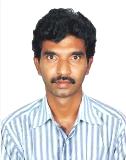
Dr. P.Mynar Babu
mynar.babu09@gmail.com

Ms. Sajida Sulthana Mohammed
3sajidasrk@gmail.com

Mrs. T.Lillyrani
lillyrani_taneti@yahoo.co.in
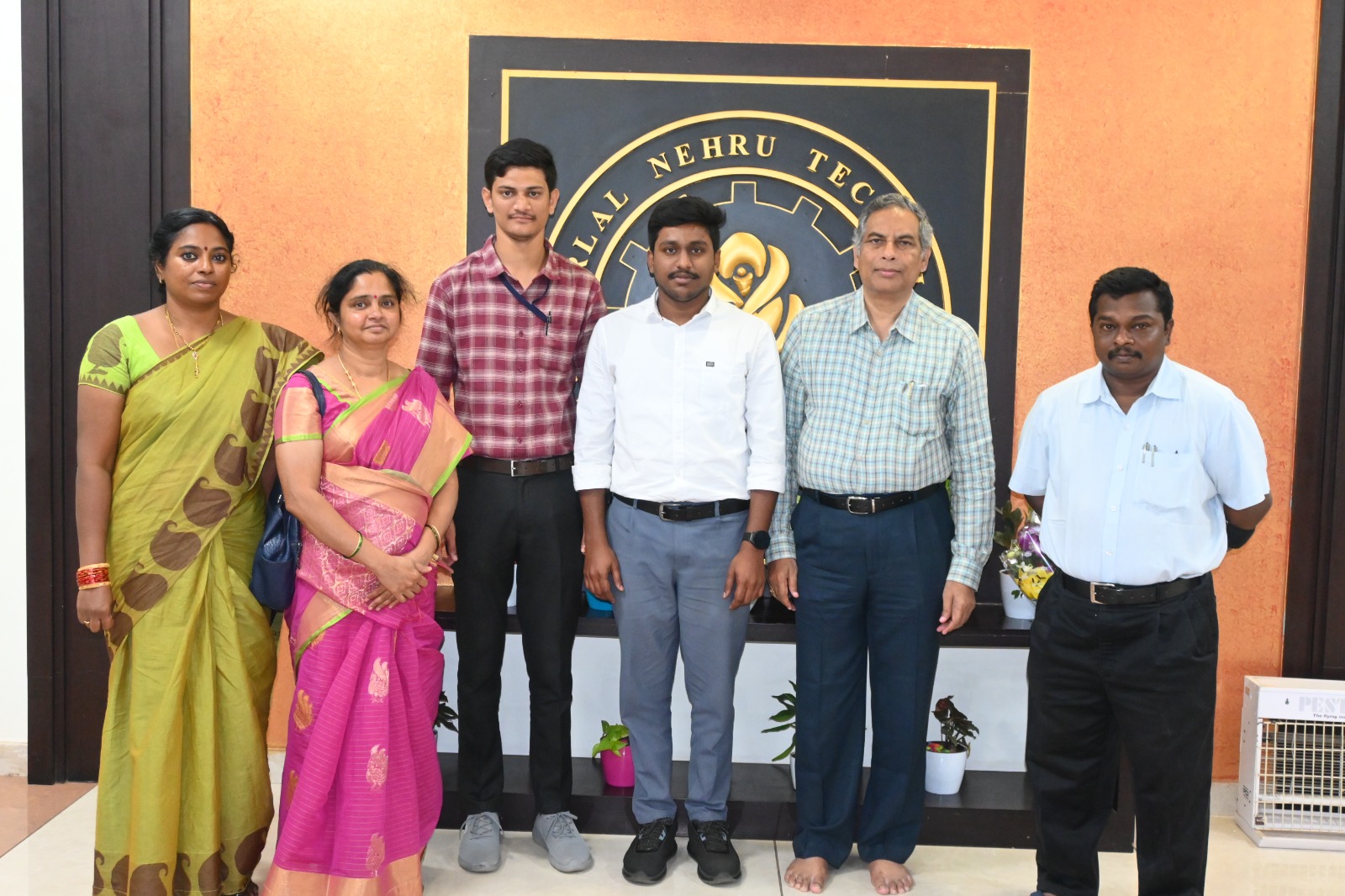
Dr. P.Rajasekhar
admin1@ucek.ac.in
Roll of Honours
| # | Register No | Student Name | Department | Year of Pass Out | Percentage | Created At |
|---|---|---|---|---|---|---|
| 1 | 10021A0548 | I Ramya Meghna | Civil Engineering | 2014 | 57.00% | 2025-05-19 05:27:08 |
Placements
| # | Htno | Student Name | Department | Employee Name | Created At |
|---|---|---|---|---|---|
No records found.
| |||||
Research and Development
Academic Research
|
S.No |
FACULTY NAME |
AY (2019-2020) |
AY (2018-2019) |
AY (2017-2018) |
AY (2016-2017) |
Total No. of publications |
|---|---|---|---|---|---|---|
|
1 |
Dr.D.Rajya Lakshmi |
10 |
01 |
04 |
05 |
20 |
|
2 |
Dr.R.Rajeswara Rao |
14 |
12 |
12 |
15 |
53 |
|
3 |
Dr.A.S.N.Chakravarthy |
11 |
03 |
10 |
17 |
41 |
|
4 |
Mr.T.Siva Rama Krishna |
05 |
02 |
0 |
0 |
7 |
|
5 |
Dr.P. Aruna Kumari |
03 |
01 |
01 |
03 |
8 |
|
6 |
Mr.S.Radha Krishna |
0 |
0 |
01 |
02 |
3 |
|
7 |
Mrs.S.Surekha |
04 |
03 |
02 |
04 |
13 |
|
8 |
Mr.R.D.D.V.Sivaram Rolangi |
0 |
0 |
0 |
01 |
1 |
|
9 |
Mr.S.Ashok |
02 |
01 |
0 |
01 |
5 |
Publications
stese
MOUs
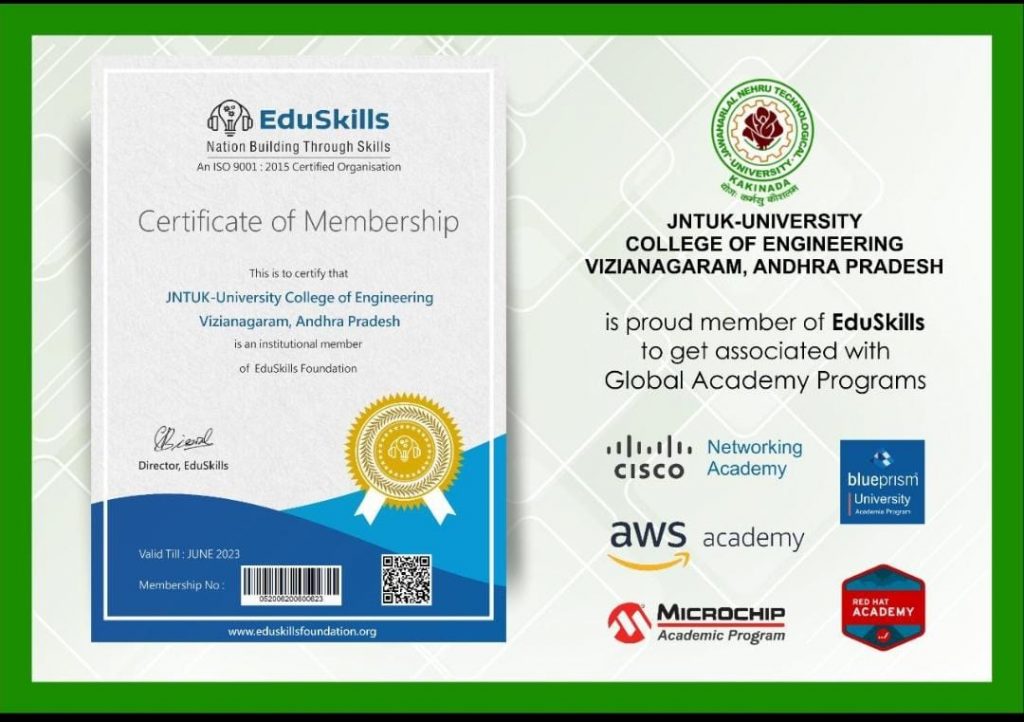 Organization Logo
Organization Logo
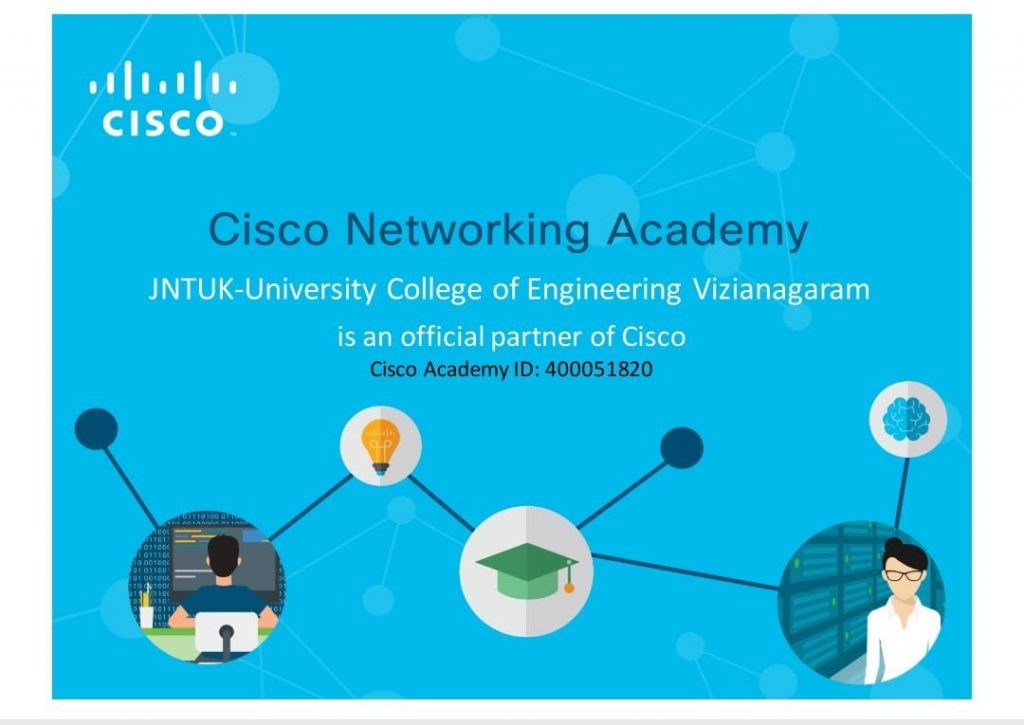 Certificate
Certificate
testing
The department has many MOUs with various organizations for enhancement of imparting essential technical skills to the students through which the faculty members and students of department of Computer Science and Engineering are being benefitted.
Dept. of CSE UCEV is associated with EDU Skills. Through EDU Skills Dept. of CSE is partnered with CISCO Networking Academy, AWS Academy, Blue Prism Academy and Redhat Academy to train students on state-of-the-art technologies and provide them with internship and placement opportunities
Dept. of CSE has CISCO Networking Academy. The Cisco Networking Academy.Cisco Networking Academy delivers a comprehensive, 21st century learning experience to help students develop the foundational ICT skills needed to design, build, and manage networks, along with career skills such as problem solving, collaboration, and critical thinking.
Cisco Networking Academy courses , including Cisco CCNA, CCNA Security, and CCNP, have a hands-on component where students set up and configure equipment. The IT landscape is evolving in an exciting way. Cisco Networking Academy program to bring technology education and improved job opportunities to individuals in your community, and beyond. Cisco Networking Academy Talent Bridge is a comprehensive employment program that further prepares students with resume and interviewing skills, and connects them to employers with the Matching Engine
Facilities
Adequate and well-equipped laboratories

| S.No | Name of the laboratory | No. of students per setup (batch wise) | Name of the important equipment | Weekly utilization status (all the Courses for which the lab is utilized) | Technical Manpower support | ||
| Name of the technical staff | Designation | Qualification | |||||
| 1 | Strength of Materials | 15 | UTM, CTM, Izod, Charpy. | 6 Hrs/ Week In Semester | Govindh | Mechanic | ITI |
| 2 | Surveying | 15 | Theodolite, Dumpy Level, Auto Level. | 6 Hrs/ Week In Semester | G. Srinivas Rao | Mechanic | ITI |
| 3 | FM & HM | 15 | Pelton wheel & francis turbine, Centrifugal & reciprocating pumps, Orfice setup, Venturimeter setup. | 6 Hrs/ Week In Semester | T.Varma | Mechanic | ITI |
| 4 | Concrete Technology | 15 | CTM, Veebee Consistometer, Compaction Factor, Mini Concrete Mixer. | 6 Hrs/ Week In Semester | G. Srinivas Rao | Mechanic | ITI |
| 5 | Transportation Engineering | 15 | Aggregate Impact Testing Machine, Viscometer. | 6 Hrs/ Week In Semester | G. Srinivas Rao | Mechanic | ITI |
| 6 | Geotechnical | 15 | CBR, Compaction Apparatus | 6 Hrs/ Week In Semester | Ch. Govind | Mechanic | ITI |
| 7 | Environmental Engineering | 15 | Jar Test Apparatus, PH apparatus | 6 Hrs/ Week In Semester | Ch. Govinda Rao | Mechanic | ITI |
| 8 | Computer Aided Engineering(CAD & STAAD.Pro) | 15 | Desktops with software’s like Autocad & STAAD.Pro | 6 Hrs/ Week In Semester | G. Srinivas Rao | Mechanic | ITI |
Achievements
Laboratories
asdsadas
